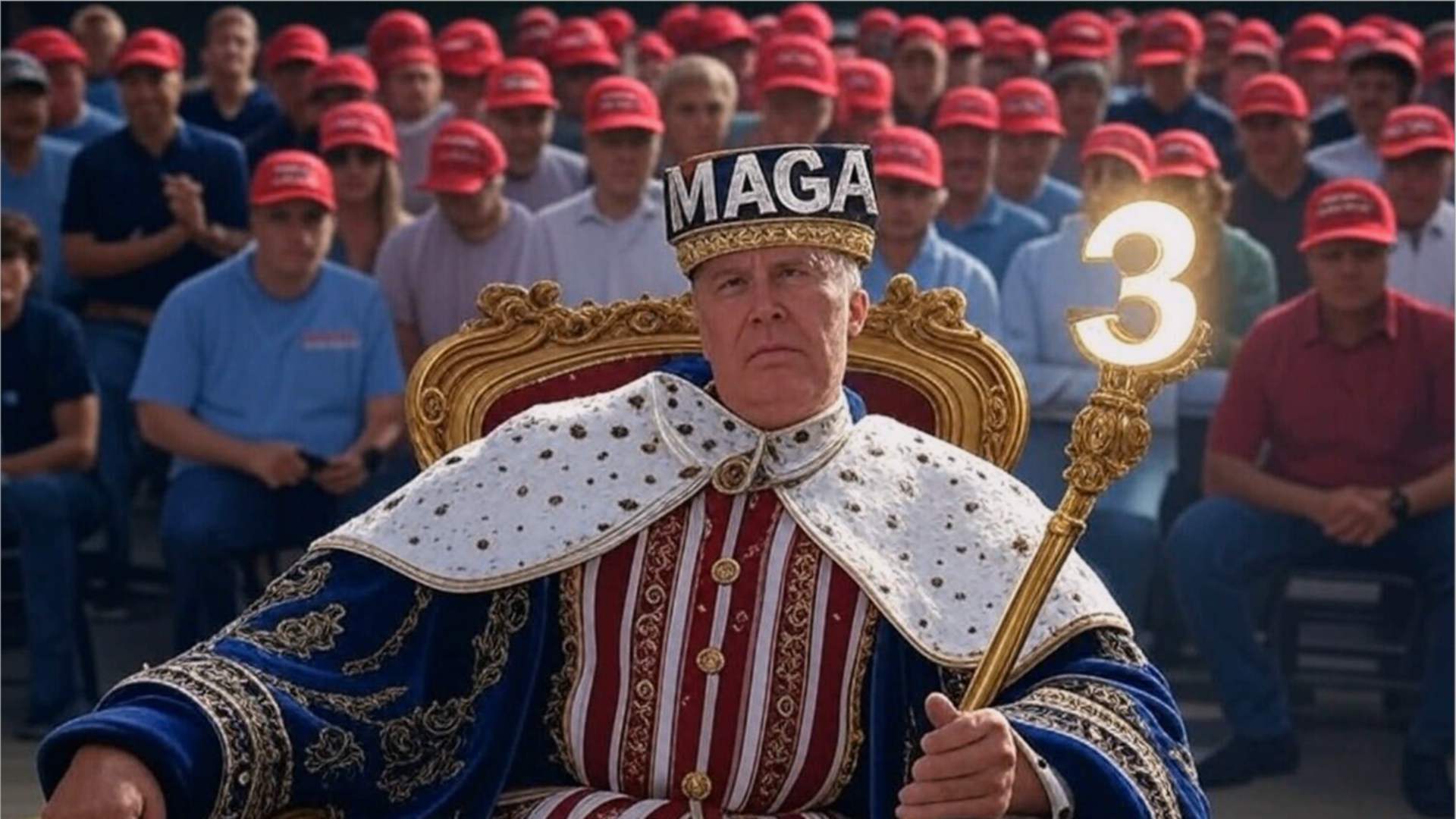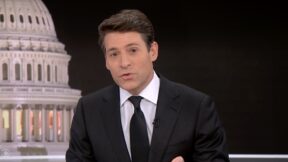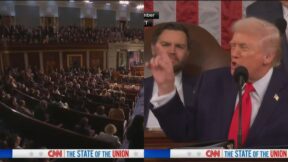Can Trump Seize Third Term if He’s Elected Speaker of the House and Stooge POTUS And VP Resign?

AI illustration/Mediaite
Supporters of President Donald Trump and others have puzzled over how he could secure a third term — would a scenario in which he’s elected speaker of the House and a stooge GOP ticket promises to resign work?
Picture this: it’s 2028 and Republican presidential candidate Robert “Kid Rock” Ritchie sweeps through the primaries by promising he and running mate Scott Baio will resign on Jan. 7, 2029 — just days after Trump is elected speaker of the House. The presidential succession kicks in, Trump is named Acting President Trump and Kid Rock accepts a demotion to Secretary of the Department of Ticketmaster.
Is it a beautiful MAGA dream come true, a resistance nightmare, or an impossible delusion?
Trump has been floating the idea of blowing off term limits for years, and one Republican has already introduced an amendment to allow it. He did it again in an interview with NBC News anchor Kristen Welker last weekend, contradicting her assessment that he’s only “joking” about it.
Then, he told reporters on Air Force One that it would actually be a fourth term because the 2020 election was “rigged” and he really won. It wasn’t and he didn’t.
Amid all the chatter, Politico ran an item listing four ways they say Trump could try to hold on to power after 2028:
If Trump decided he wanted to hold onto power past 2028, there are at least four paths he could try:
- He could generate a movement to repeal the 22nd Amendment directly.
- He could exploit a little-noticed loophole in the amendment that might allow him to run for vice president and then immediately ascend back to the presidency.
- He could run for president again on the bet that a pliant Supreme Court won’t stop him.
- Or he could simply refuse to leave — and put a formal end to America’s democratic experiment.
That second “loophole” is incorrect, however — the 12th Amendment states that “no person constitutionally ineligible to the office of President shall be eligible to that of Vice-President of the United States.”
However, the U.S. Constitution attaches no such requirement to officeholders who are further down the list of presidential succession. While a coordinated multiple resignation was once unthinkable, it is very much thinkable after all we’ve been through.
The 20th Amendment simply says that “the Congress may by law provide for the case wherein neither a President elect nor a Vice President elect shall have qualified, declaring who shall then act as President, or the manner in which one who is to act shall be selected, and such person shall act accordingly until a President or Vice President shall have qualified.”
Now, the Presidential Succession Act of 1947 sets out the hierarchy of ascension in use today:
- Vice President
- Speaker of the House
- President Pro Tempore of the Senate
- Secretary of State
- Secretary of the Treasury
- Secretary of Defense
- Attorney General
- Secretary of the Interior
- Secretary of Agriculture
- Secretary of Commerce
- Secretary of Labor
- Secretary of Health and Human Services
- Secretary of Housing and Urban Development
- Secretary of Transportation
- Secretary of Energy
- Secretary of Education
- Secretary of Veterans Affairs
- Secretary of Homeland Security
- Kiefer Sutherland (JK)
But not so fast there, Speaker Trump. The act also contains a provision similar to the one that disqualifies Trump from being selected as VP:
(e)Subsections (a), (b), and (d) of this section shall apply only to such officers as are eligible to the office of President under the Constitution. Subsection (d) of this section shall apply only to officers appointed, by and with the advice and consent of the Senate, prior to the time of the death, resignation, removal from office, inability, or failure to qualify, of the President pro tempore, and only to officers not under impeachment by the House of Representatives at the time the powers and duties of the office of President devolve upon them.
So the short, technical answer is “no,” the law will not allow Trump to seize a third term through synchronized resignations. On the other hand, it is much easier to amend the U.S. Code than it is to pass a new constitutional amendment. This is especially true if Senate Republicans became willing to nuke the 60-vote threshold to do it.
Would people stand for such a change? That’s hard to predict, but the idea of a third Trump term is overwhelmingly unpopular. While 56 percent of Americans think Trump will try, a whopping 69% say Trump definitely (60%) or probably (9%) should not be allowed to seek a third term. But it’s difficult to measure how intense those beliefs are.
But this second Trump term has been all about testing the limits of presidential power, no doubt emboldened by the Supreme Court’s immunity decision. A far more likely scenario is the one that Jim Acosta laid out recently.
On Monday’s edition of his Substack video podcast The Jim Acosta Show, Acosta laid it out:
He just announces that he’s to do it even if the Constitution says you can’t do it. He starts getting on ballots in various primary states, caucus states, and of course these state party chairmen and chairwomen and so on are not going to stand up to him.
And we’ll do these stories all over again about how the Republican party is the party of Trump and they won’t deal with any of this shit.
And then he’s just going to start winning primaries and he’s going to say to the Supreme Court. “Well, this is what the people want. This is democracy,” and he’s gonna force yet another constitutional crisis, and we’ll talk about that.
I mean, I hate to make it sound so realistic, but that to me is something that could happen.
But in addition to that, Trump could grease the wheels even further by packing the court with more MAGA justices to ensure the result he wants. He could appoint additional justices by executive decree and then, as with everything else, dare someone to stop him.
And finally, if all else fails, he could simply declare the results of the 2028 election fraudulent and refuse to leave office.
So much of the chatter around whether or not Trump could get away with these things is about whether or not the American people would stand for it. But as we have seen, the American people will stand for an awful lot. Even if they don’t want Trump to have a third term, what are they willing to do to keep him from it?
All available evidence says not enough.
This is an opinion piece. The views expressed in this article are those of just the author.
New: The Mediaite One-Sheet "Newsletter of Newsletters"
Your daily summary and analysis of what the many, many media newsletters are saying and reporting. Subscribe now!






Comments
↓ Scroll down for comments ↓